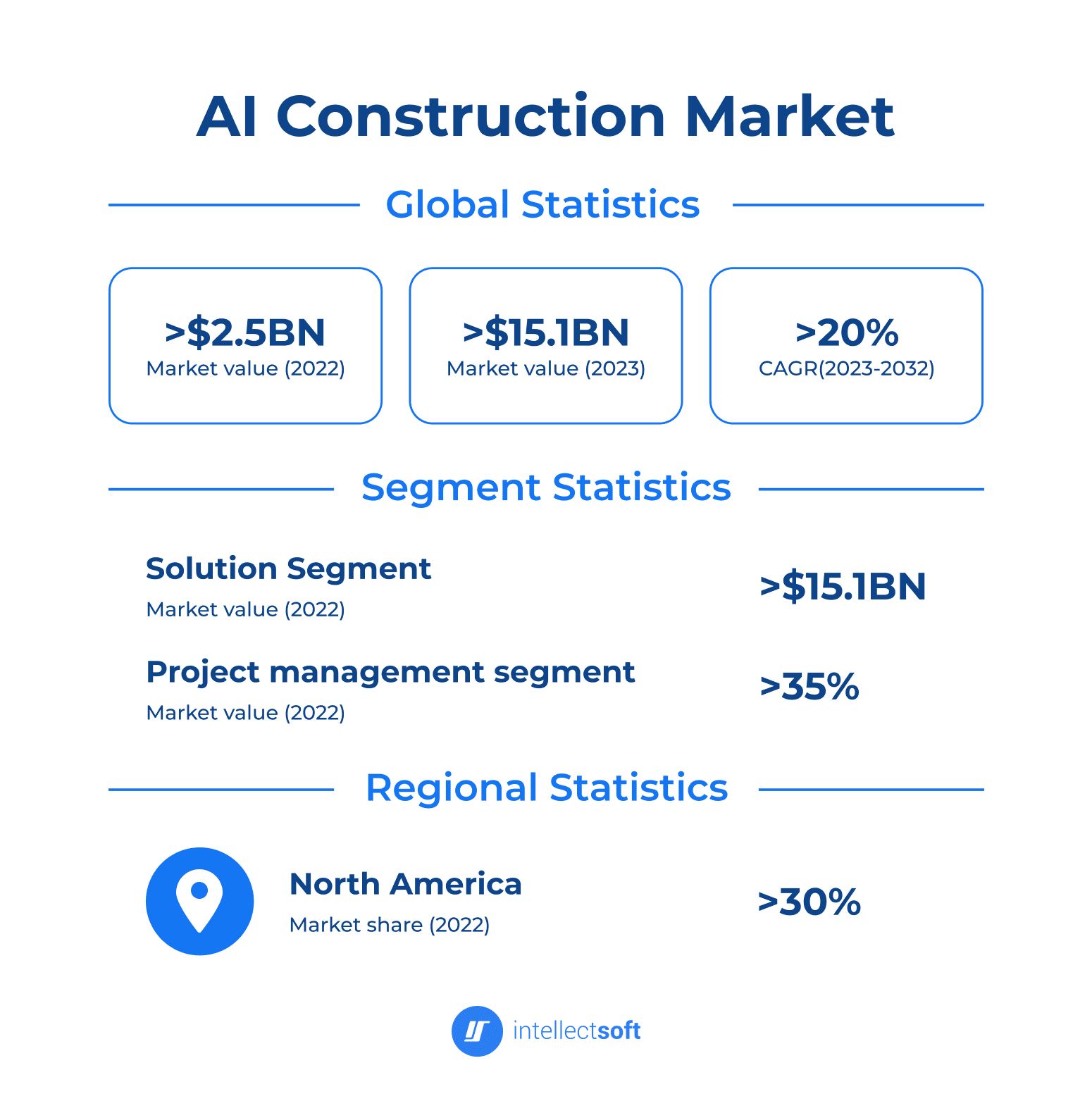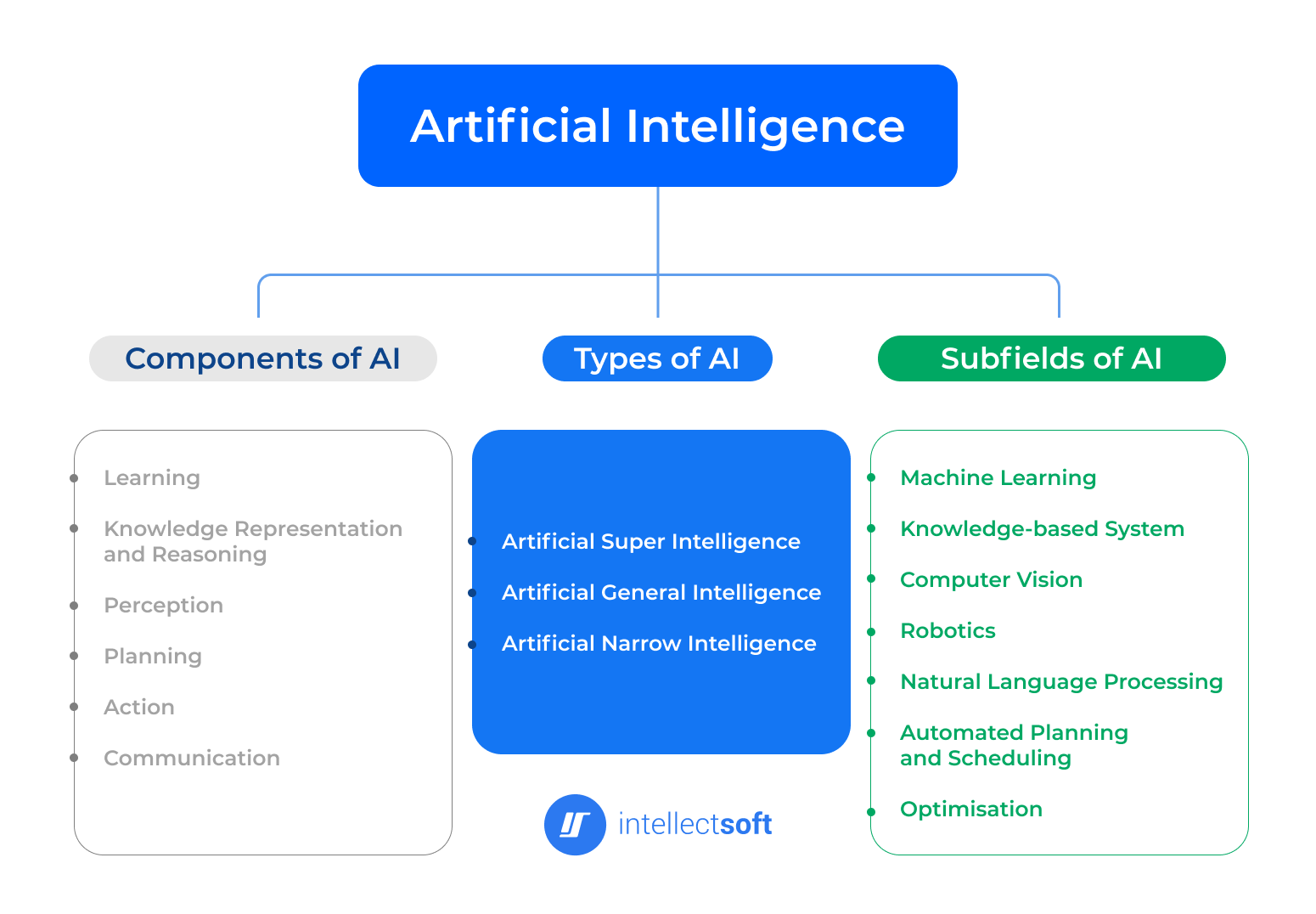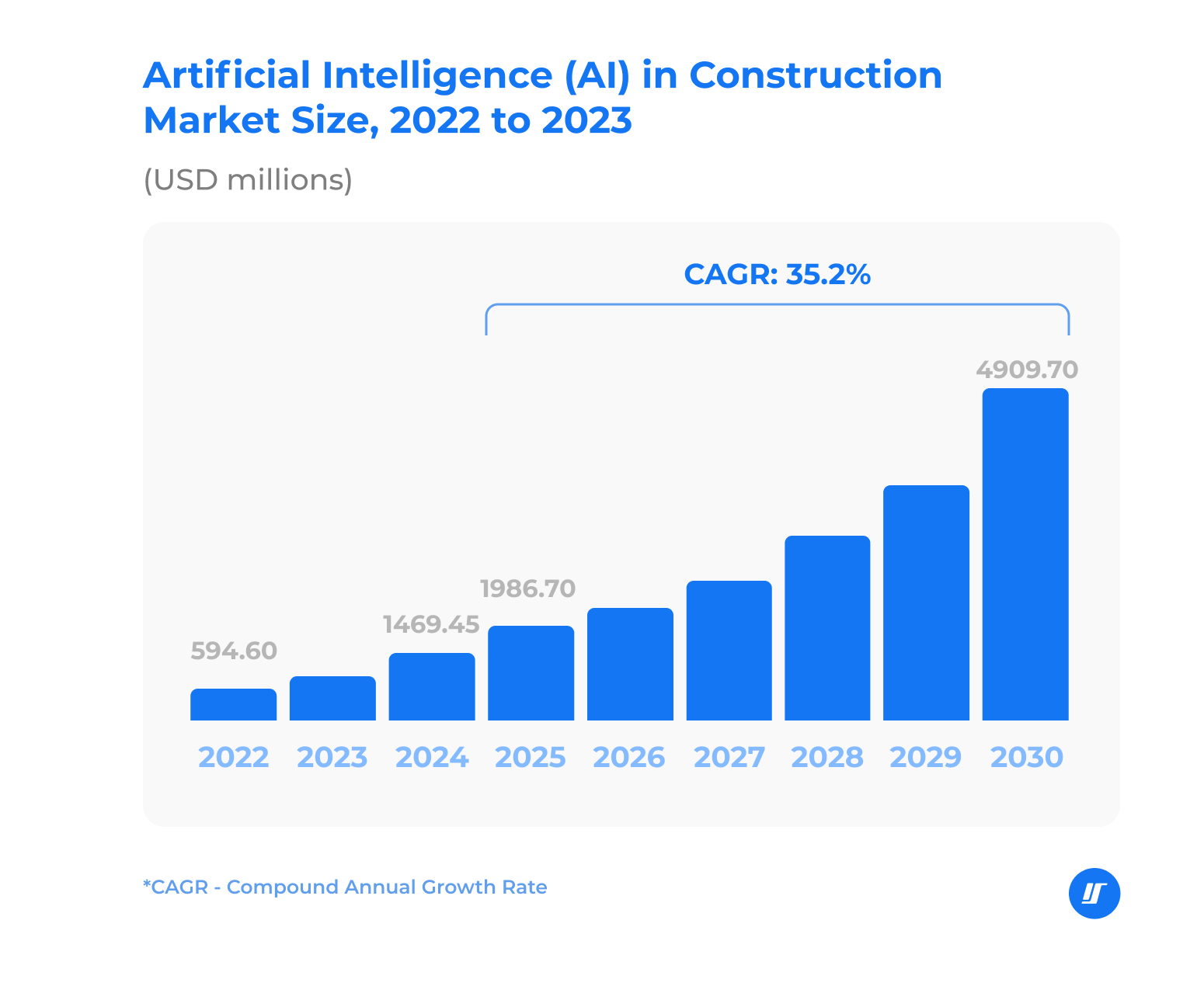The construction industry is experiencing a profound shift in an era of technological innovation. The game-changer is called AI, a short for Artificial Intelligence. But what kind of intelligence does it stand for, what are the benefits of AI development solutions in construction, and does it threaten human expertise? This article is your gateway to understanding how AI is revolutionizing construction, from its fundamental concepts over real-world applications to the challenges and prospects that lie ahead.
Let's get acquainted.
Understanding AI in Construction
We live in an age of digital advancements. That means industries worldwide are more than willing to harness the power of what we know as Artificial Intelligence (AI) to their advantage. As a result, the strategies to streamline operations and improve efficiency have never been more accessible, leading to highly productive, time- and cost-effective developments.
The AI application prospects are particularly notable in the construction industry, traditionally reliant on manual labor and complex administration systems. Combined with machine learning and deep learning, an array of digital automatization, calculation, and control systems has been gradually reshaping the trade as we know it.

But before delving into the benefits and use cases of artificial intelligence in construction, let's deal with the essentials and clearly distinguish the concepts.
What is AI?
The primary characteristic of AI technology is its ability to process immense amounts of data within seconds and yield viable results in return.
Artificial intelligence is a data-driven, science-based technology. It analyzes, calculates, compares, identifies, and summarizes. Consequently, artificial intelligence is able to:
- Identify strengths and weaknesses
- Provide insights and make predictions
- Recognize or create patterns
- Optimize processes
- Add in architecture and building design
- Provide recommendations/propose solutions
In certain instances, properly applied AI in construction can even make decisions.
Machine Learning and Deep Learning Concepts
Machine learning is a subfield, a background process. It renders the machine able to learn "from experience," eliminating the need to program it for each specific task separately. In simple words, more data to analyze means more developed AI capabilities.
However, the method is more complex and requires trainers who work on algorithm development, facilitating computers to perform required tasks based on available data.
Deep learning is a part of that method. It employs digital "neural" networks to analyze and crack the data to improve further the software's ability to handle complex tasks. These systems strive to emulate the human brain's learning mechanism.

Regarding artificial intelligence in construction, the best strategies involve a blend of machine learning, deep learning, and human control/execution. AI-driven algorithms can help optimize building design, energy efficiency, and maintenance. Meanwhile, smart buildings equipped with sensors and data analytics improve occupant comfort and reduce energy consumption.
The future of construction lies in the implementation of AI, and it's exciting to witness how its integration will shape building designs in the coming years.
What Are the Benefits of AI in the Construction Industry?
AI in construction has revolutionized the industry by bringing in smart building technology that holds immense application prospects in every sector, offering numerous advantages. Citing them all would produce a long read so that we will focus on the most significant examples instead.
Efficient Planning and Scheduling
AI can streamline project schedules by considering the weather, materials, and workforce availability. It can also predict potential delays and suggest adjustments, ensuring projects remain on track. That way, it provides invaluable assistance in planning and scheduling, leading to optimized resource allocation, reduced costs, and timely project delivery.
- In short, with the help of AI, construction managers can now ensure a smoother and more efficient completion of projects.
Enhanced Risk Management
Using artificial intelligence in construction helps managers identify potential safety hazards on building sites by analyzing data from sensors, security cameras, and other smart building devices. This data is processed by algorithms that, in return, detect perilous situations before they emerge and alert site managers in advance. AI can also help see flaws in building materials and designs, reducing the risk of costly rework or building collapse.
- In short, by leveraging these capabilities, AI and construction companies can ensure safer and more efficient building environments.
Improved Resource Management
Artificial intelligence in construction allows for smart building design with superb efficiency and precision. This technology can optimize the resource distribution, from materials to labor and energy. AI can assist construction managers in recognizing potential resource shortages by analyzing data and making real-time adjustments, thus ensuring that the appropriate materials and personnel are available when needed.
- In short, AI allows for a streamlined construction process that saves time and resources while improving the overall quality of the project.
Quality Control
AI-powered visual inspection systems exhibit exceptional precision in detecting (thus preventing) potential problems. For instance, using AI-powered drones and cameras enables real-time monitoring of the construction to identify structural defects or material quality issues.
- In short, AI in the construction industry guarantees that projects meet the highest quality standards, ultimately promoting customer satisfaction.
Cost Reduction
By leveraging AI technologies, construction companies can monitor and predict the performance of buildings, automate repetitive tasks, and optimize the use of resources such as electricity and water. By identifying and addressing inefficiencies, AI in the construction industry can help save money and improve project efficiency. As the technology continues to evolve, AI is poised to become an integral part of the construction industry, transforming how we build and sustain our environment.
- In short, by optimizing processes and resources, AI can help reduce construction costs and enhance productivity, making projects more financially viable.
Improved Efficiency
Smart building technology has made it possible to have real-time monitoring of various systems. That includes energy use, lighting, and temperature control. AI for construction processes the collected data to identify patterns and determine what areas need improvement. That way, building managers can optimize systems and avoid waste of resources.
- In short, AI algorithms enhance overall operational efficiency, rendering projects more cost-effective.
Use Cases for AI in Construction
Let's now explore the examples of artificial intelligence in construction and the most common practical applications.
Smart Building Design
AI can analyze data from smart sensors to design buildings characterized by energy efficiency, sustainability, and responsiveness to user needs.
Autonomous Machinery & Robotics in Construction
Robots driven by AI and equipped with sensors and cameras can perform repetitive or hazardous tasks, such as bricklaying or excavation, with precision and safety. Robotic arms and machines equipped with AI capabilities can work perpetually, reducing labor costs, enhancing efficiency, and expediting project timelines as a result.
Predictive Maintenance
Unforeseen machinery breakdowns can be financially draining and disruptive. AI's predictive capabilities make it possible to optimize maintenance needs, ensuring timely interventions that minimize costly downtime.
Real-Time Project & Site Monitoring
To prevent means to predict. Real-time information on a project's status can be provided via AI, allowing stakeholders to act fast and decisively.
In addition, AI-powered drones and cameras can perform round-the-clock monitoring of construction sites, scanning safety compliance and adherence to plans to ensure projects stay on track.
Automated Documentation
AI can automate the administration of construction documents, reducing administrative workload in return.
Building Information Modeling (BIM)
BIM harnesses AI to create elaborate 3D visualizations of construction designs. This collaborative tool promotes informed decision-making, resulting in more accurate and efficient project execution.
Predictive Analytics
AI algorithms analyze historical project data to predict potential issues and recommend proactive solutions. Such an approach mitigates risks and aids in cost control.
Data-Driven Decision Making
AI empowers informed decision-making by processing profuse project data. Project managers can optimize resource allocation and identify areas for improvement, leading to better outcomes.
Future of AI in Construction: Challenges and Prospects
The potentials of AI in construction are virtually endless, starting from the investment decision. As we know, traditional project development requires a significant amount of time and labor, also involving numerous factors such as building codes, materials, and environmental conditions. All these fields can benefit from digital assistance. Machine learning algorithms can simultaneously analyze a variety of copious databases to identify the ideal structural design that would comply with all relevant aspects.
Undoubtedly, AI will soon bring more irreversible changes to the construction industry. But those changes do not render the human factor obsolete. On the contrary, a fusion of artificial and real intelligence and expert engineering is a beacon of hope that will guide modern society into the future, where the structures are more reliable, more sustainable, and more adaptable to fluid market requirements.

According to analytics portals such as The Mordor Intelligence, "the artificial intelligence market in construction is expected to reach USD 9.53 billion by the next five years, registering a CAGR of 24.30% during the forecast period."
Meanwhile, the Global News Wire forecasts that "the solution in Artificial Intelligence (AI) in Construction Market sales will account for more than 55% of total sales by 2030." They also expect software industry leaders like Microsoft, Oracle, and IBM to assume a severe position in the race.
What About the Challenges?
While AI benefits the construction industry considerably, it is necessary to determine what obstacles stand on the road to success. Integrating AI construction technologies demands substantial investments, and many companies are still in the early stages of adoption. Moreover, machine learning and deep learning require a continual influx of fresh, accurate, and reliable data, which is not always accessible.
The broad implementation field also implies various challenges, such as data privacy concerns, integration complexities, and the need for specialized skills.
And finally, the industry takes into account a growing concern about the impact of AI construction systems on the human labor market.
Nevertheless, the potential for innovation and efficiency gains far outweigh the hindrances, and the prospects are bright.
Conclusion
AI is set to revolutionize the construction industry by improving efficiency, reducing costs, and enhancing safety. With that established, all that's due is to find a reliable partner with sound expertise in the field.
Intellectsoft, a leading technology solutions provider, is at the forefront of AI development for the construction sector. With a portfolio of successful projects, we offer cutting-edge solutions to transform traditional processes.
From optimizing project timelines to enhancing safety, Intellectsoft is guiding the way in providing innovative solutions for smart buildings. Our field encompasses everything from ERP, analytics, and inspection management to system integrations, project onboarding, and professional training.
In addition, we offer you the possibility to develop a tailored solution that integrates essential functions within your construction business processes. It will automate core processes, including HR, accounting, project management, and more, fostering seamless collaboration to maximize project efficiency and profitability.